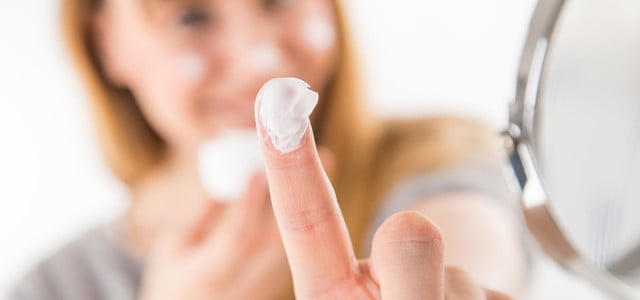
It starts at around 25 years of age: our skin begins to age. Small and large wrinkles write the story of our lives on our faces. The good news is that we can influence how quickly this happens.
An unmistakable sign of aging are small and eventually deeper wrinkles on the face. The business around these wrinkles is booming: There are creams, moisturizers and masks, but also injections and surgical procedures that are supposed to rejuvenate the skin. Because most people want to grow old, but don’t want to look old.
It is completely normal for our skin to age. It starts around the age of 25. One reason for this is that the cells in the skin are no longer as active, says Prof. Christiane Bayerl. She is the director of the Clinic for Dermatology and Allergology at the Helios Dr. Horst Schmidt Clinics in Wiesbaden.
One consequence of these less active cells is that the number of collagen fibers and elastic fibers in the middle layer of the skin, the dermis, decreases. As a result, the skin loses moisture and elasticity. Wrinkles appear.
Aged skin protects less
Skin aging is no longer just about appearance. The skin, as our largest organ, has important functions for the body. “The skin protects us from pathogens and from water loss,” says Julian Nüchel, group leader at the Center for Biochemistry at the University of Cologne.
When the skin loses strength, it also means that inflammation occurs more frequently and pathogens can penetrate the body more easily. “That’s why you should keep your skin healthy for as long as possible. The sooner you start, the better,” says Nüchel.
Our predisposition plays a role
How quickly the skin ages depends on various factors. A lot of it is down to genes, says Nüchel. “Even with a good lifestyle, some 80-year-olds still have very good skin, while others already have deep wrinkles.” If you take a look at the older members of your family, you can get an idea of what your own skin might look like later.
However, lifestyle also influences how early and how deep wrinkles appear on the face. And this is where we can start.
1. Sun protection – even in winter
“UV protection is the ultimate prevention,” says dermatologist Christiane Bayerl. The sun’s UV rays stress the skin, and can result in earlier wrinkles and pigment spots. Among other things, the sun’s radiation damages our DNA. This can not only cause the skin to age – unprotected sunbathing can also cause skin cancer.
We can protect ourselves by spending particularly intense hours of sun in the shade or indoors. And of course: when we are outside, we should cover our skin with textiles or apply plenty of sunscreen. “Especially in sunny months, the creams should also protect against UV-A radiation,” says Julian Nüchel. This is because this radiation contributes significantly to skin aging. He also recommends year-round sun protection: “The sun also has radiation in winter.”
2. Avoid smoking and stressful environmental influences
Another major stress factor for the skin: smoking. “It affects the blood vessels and makes you look rather pale,” says Christiane Bayerl. Studies show that the longer and more you smoke, the older your skin looks. This is even more true for women than for men.
Other environmental influences also have a negative impact on the skin, says the expert. Nitrogen oxides, which are emitted in particular by diesel vehicles, are one cause of age spots, she explains. “Studies have shown that skin spots make people look ten years older.”
3. The right diet is important
Healthy skin: This requires a balanced diet: The skin’s menu should include fruit and vegetables, says Christiane Bayerl. The antioxidants they contain can capture so-called free radicals. These can also accelerate skin aging. “It is also important to consume collagen,” says the dermatologist. These are proteins that are found in meat, fish, eggs and dairy products, among other things. Vegans can rely on foods that support the body’s own collagen production – these include pulses, nuts and avocados.
“It has also been scientifically proven that vitamins A and C slow down skin aging,” says Julian Nüchel. This applies to the vitamins in food, but also to the vitamins as ingredients in creams.
4. Face creams can also help
When it comes to vitamins in creams, it always depends on how much is in them. “If it contains less than ten percent vitamin C, a cream is not very effective,” explains Nüchel. And the rule is: “Creams only help with what are known as wrinkles,” says Christiane Bayerl. In other words, with finer wrinkles.
Basically, the two experts recommend getting to grips with your own facial care. “You have to put in some work to develop the right routine for you,” says Julian Nüchel. What care is good for you depends on your type, but is also influenced by the time of year and your phase of life.
“There are anti-aging creams that we as doctors can prescribe,” says Christiane Bayerl. She particularly recommends these to women before and during menopause, when the hormones in the body change. Because this also influences skin aging.
Before that, it’s worth paying attention to your skin’s needs. Dry skin can also accelerate the aging process. “If your skin feels tight or burning, you can give it what it needs,” says the dermatologist. In this case, that means a good dose of moisture.
Read more on Techzle\.com:
- Dermatologist: This is what happens to your skin when you drink a lot of water
- Rose quartz facial roller: The dark side of the cosmetic trend
- Vitamins for the skin: These are the most important
** marked with ** or orange underlined Links to sources are sometimes affiliate links: If you buy here, you are actively supporting Techzle\.com, because we then receive a small part of the sales proceeds. More information.